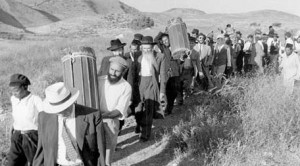A recent opinion piece in The Daily Dartmouth, written by SJP co-Presidents Feras Abdulla and Reem Chamseddine, outlines the background and current status of the Nakba, a day of significance to Palestinians. The article is a concise statement of one side’s view of a key aspect of one of the most contested international issues of our times. It provides a brief counter-narrative to the accepted history of the founding of the state of Israel and some of the many conflicts that have occurred in the 65 years since. The writers describe how Arabs living in the new state of Israel were forcibly deported, and how in the years since, Israeli troops have engaged with Palestinians, “with the casualties much lighter on the Israeli military side.”
While a day such as Nakba is an important part of the oft-repeated historical axiom of, “Never forget,” there are two main issues that this opinion piece raises. The first is one of dates: it should be noted that Nakba takes place on the Gregorian date of May 15, a day that is still over a week away. The question then arises of why it take place on this day and why this article has been published so early. The answer lies in the difference between the Hebrew and Gregorian calendars. May 15 is the Gregorian date of the proclamation of Israeli Independence, while the Hebrew date varies falls on the evening of May 6 to the evening of May 7 in 2014. The two commemorative days have therefore diverged in the actual day of observance, even though they commemorate the same event. Unfortunately, it is not that simple. In Israel, Yom Ha’atzmaut, or Independence Day, is the last of a chain of important days. It not only closes Holocaust remembrance week, but is immediately preceded by Yom Hazikaron, or Remembrance Day. This is the equivalent of the American Memorial Day, and it commemorates the lives of soldiers who have perished in the defense of the State of Israel as well as civilians who are victims of terror attacks and other violence. This Remembrance Day is marked by a period of mourning, including a two minute sounding of the air raid sirens all over Israel, in which the entire country stands still. The following Independence day is then a day of celebration, marked by happiness in contrast to both the preceding day and preceding week. By releasing their opinion piece on the Israeli Day of Remembrance, more than a week in advance of the day it was written about, the SJP presidents made a definite statement, conscious or unconscious, that ignored and even targeted Israeli loss, a sentiment enhanced by the formerly quoted line, “with the casualties much lighter on the Israeli military side.”
This was, in a broader sense, the other issue raised. The article that appeared in The Daily Dartmouth failed to mention that its entire narrative was disputed. While no one can deny the hardships of the Palestinian people, the version of history laid out in what was, it is important to note, an opinion piece, is the topic of an ongoing debate. The exact nature of the Arab exodus from the newly declared State of Israel, the main focus of the article, is in many ways the center of the Israel-Palestinian conflict. While the piece emphasizes that Arabs were, “driven out of their homes to make way for incoming Israelis,” the conventional narrative accept by most historians is much different. Most consider the Arab exodus to be the result of three factors. First, Arabs left because they were worried that the victorious Jews would massacre their communities, just as the Arabs had previously done to Jewish communities. (No such massacres were exacted on Arabs who remained.) Second, surrounding Arab states encouraged Arabs to leave, in a partially political effort to secure international support. Third, some Arabs were forcefully deported, though this constituted only a small percentage of the total Arabs who left.
In addition, the many other events mentioned are also described from a narrow view point. For example, what is called the, “Gaza massacre of 2008-09,” is traditionally termed the, “Gaza War.” It is portrayed in the opinion piece as a one-sided massacre of Palestinians by Israel troops, while Israelis and the majority of others consider it a two-sided conflict. It is widely regarded as a justified attempt by Israeli forces to put an end to the years of terror attacks stemming from the Gaza strip that targeted Israeli civilians. Contrary to the image put forward by the opinion piece, it was a targeted attack on known weapons caches and the majority (though unfortunately not all) of the casualties were terrorist combatants.
While we must support efforts to commemorate all civilians affected by such tragedies as the Israeli-Palestinian conflict, we must also remember that we cannot do so at the expense of others’ commemoration.


Be the first to comment on "A Question of Days"